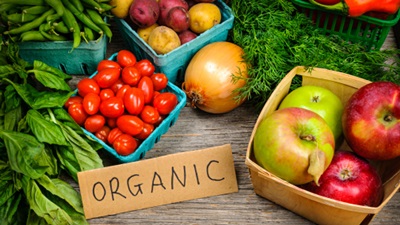
There are always different reasons people do different things, and the same thing applies to the organic food debate.
Some people go organic because they think it’s healthier. Is it? What are the benefits of organic food?
Are there health benefits of organic food?
Some studies have shown that if you’re just comparing the nutrient content of organic and non-organic food, then the benefits of organic food are few.
Dena Bravata, MD, MS, a senior affiliate with Stanford University’s Center for Health Policy, Crystal Smith-Spangler, MD, MD, and instructor in the school’s Division of General Medical Disciplines, and a physician-investigator at VA Palo Alto Health Care System, did a study comparing organic and conventional foods.
The researchers didn’t find significant differences in the health benefits of organic foods, although one nutrient, phosphorus, was significantly higher in organic foods than conventionally grown produce. There weren’t any specific fruits and vegetables identified as being the healthier choice for phosphorus.
The use of pesticides
Despite the study, there are people who choose organic over conventional food for greater sustainability within the environment, since organic produce doesn’t contain chemicals such as synthetic pesticides, herbicides, fungicides, or fertilizers (they only use natural pesticides or fertilizers). This is one of the main benefits of organic food.
Another one of the benefits of organic food is the effect on your organ.When organic foods are digested, it can ease the work of the liver, which is often exposed to many toxins from your everyday life. Organic farming strives to help maintain and improve the quality of topsoil.
Small doses of pesticides and other chemicals can have adverse effects on health in children, especially during fetal development, according to the Environmental Working Group (EWG), a nonprofit organization that advocates for global protection policies and individual health.
Is the cost of organic food worth it?
With the cost of purchasing organic produce being more expensive than conventional produce, it might be more difficult for all your produce to be organic. However, with creative budgeting and cutting out certain materials from your lifestyle, you might find that you can afford to buy organic and reap the benefits of organic food.
If you can’t afford to buy organic food all the time, then here are five healthy foods that are especially important to buy organic.
Before we look at those healthy foods, here are a few tips to preserve your health, whether you’re buying organic food or not. Remember to wash all of your fruits and vegetables, regardless of the organic label. Organic foods can be purchased at local farms, farmer’s markets, health food stores and some supermarkets as well.
If your product has a USDA certified organic seal, it contains approximately 95% organically grown ingredients. Also, consider organically growing your own produce.
1. Leafy greens
Lettuce, spinach, kale, and chard are great for salads, although sprayed chemicals tend to remain in the leaves, which is potentially more harmful. Kale and collard greens contain highly toxic organophosphate insecticides and should be purchased organically. Spinach contains the more potent systemic pesticides, according to FDA studies, and contains carcinogens and most endocrine disrupters. Since leafy greens are definitely healthy foods, try to reap the benefits by eating the organic kind.
2. Stone fruits
The sweetness of stone fruits, such as peaches, pears, cherries, apricots, plums and nectarines, often attracts many insects. This is the reason they would be sprayed with pesticides. The skins of stone fruits are absorptive, and they tend to retain more of the chemicals. About 70% of all stone fruits contain residues. According to the USDA, about 97% of nectarines contain pesticides. The EWG also warns about peaches and pears containing a high concentration of pesticides.
3. Corn products
Nonorganic corn has the risk of being genetically modified, and is heavily treated with the herbicide atrazine. Corn is also sprayed after harvesting. Within an American diet, corn is a popular food, though nearly 50% of all pesticides are sprayed on corn. These healthy foods should always be bought organic.
4. Berries
Strawberries are considered the most heavily contaminated produce item, according to data from a number of environmental groups such as EWG and the Pesticide Action Network North America. Strawberries that are out of season may be more treated, especially before shipping, because they come from other countries.
Other berries such as raspberries, blueberries and blackberries have high pesticide exposure during cultivation. It is best to find an untreated patch and pick your own berries, or buy organic.
5. Meat
Researchers report that meat is among the most contaminated products in our food supply. The residue from the animal feed’s antibiotics, synthetic growth hormones, and steroids may still be in your meat. If you do eat meat and can afford it, choose less chemically treated and cured meats, which are organically raised.
The FoodsForBetterHealth Bottom Line
The organic food industry will have its critics, but there are benefits of organic food. With any major change you make within your lifestyle, it is important to transition. Go organic for the right reasons! Singling out leafy greens, stone fruits, corn products, berries and meat to purchase organically will get you on the right path.
Sources:
Haas, E., Staying Healthy with Nutrition: The Complete Guide to Diet and Nutritional Medicine (New York: Ten Speed Press, 2006), 438-443.
Dupont, C., The New Enlightened Eating: Simples Recipes for Extraordinary Living (Summertown: Books Alive, 2012), 4-5.
Fisher, S., “The Benefits of Organic Food Versus Non-Organic Food,” Yahoo! Voices web site, Feb. 14, 2008; http://voices.yahoo.com/the-benefits-organic-food-versus-non-organic-food-901111.html.
“Why Choose Organic Foods Over Conventional Foods,” The Organic Foods Data Base web site; http://www.organicfooddatabase.net/why-choose-organic-food.php.
Novella, S., “No Health Benefits from Organic Food,” Science-Based Medicine web site, Sept. 5, 2012; http://www.sciencebasedmedicine.org/no-health-benefits-from-organic-food/.
Brandt, M., “Little evidence of health benefits from organic foods, Standford study finds,” Stanford School of Medicine web site, Sept. 3, 2012; http://med.stanford.edu/ism/2012/september/organic.html.













